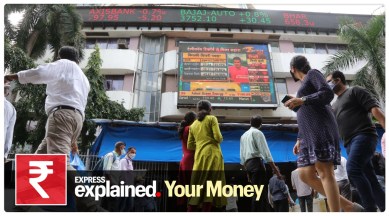Stock markets and Omicron: why investors need not panic yet
🔴 Amidst a rise in Covid-19 cases, the stock markets have remained largely unaffected. Who has been investing? What are the concerns? What should investors do?

At a time when the third wave of Covid-19 has spread rapidly and several states have imposed restrictions, the stock markets have remained largely unaffected. While the number of active Covid cases has risen from under 10,000 on December 28 to around 90,000 on Wednesday, the benchmark Sensex has jumped over 2.400 points, or 4.2%, from 57,794 on December 30 to close at 60,223 on Wednesday. The markets, however, witnessed a 1% correction on Thursday in line with global markets after the minutes of the US Federal Open Market Committee meeting held on December 14-15 indicated a more hawkish monetary policy stance.
Who have been investing?
While domestic institutional investors have remained big bulls over the last six weeks, with foreign portfolio investors being net sellers, the recent rally has been supported by an FPI inflow. Data from National Securities Depository Limited show that over the last three trading sessions, FPIs have invested a net of Rs 4,306 crore, compared to the net of over Rs 40,000 crore they have pulled out since November 22, 2021, amid indications that the US Federal Reserve would tighten its monetary policy.
Market participants say the fact that the Reserve Bank of India may now defer any plans to raise interest rates in India has provided another fillip to the market.
Investors are also drawing comfort from the general understanding that Omicron, while being a fast-spreading variant, causes less severe disease, and that state governments may not go for stringent lockdowns that would hurt economic activity too much.
“Dow Jones setting a new all-time new high when the number of daily Omicron cases crossed one million in the US might appear as a paradox, but this is a clear message from the market that the fast-spreading, less virulent variant of the virus marks the beginning of the end of the pandemic. Also, most countries are not imposing fresh restrictions impacting economic activity,” said V K Vijayakumar, Chief Investment Strategist at Geojit Financial Services.
What are the concerns?
As seen on Thursday, the markets are likely to see bouts of volatility due to concerns over inflation, higher interest rates and increasing Covid cases. The minutes of the meeting released by the Fed on Wednesday indicated that it might not only raise interest rates sooner than expected but also reduce its asset holdings to check inflation.
The Dow Jones index fell 1.07% on Wednesday, and the Nasdaq 3.3%. Following this, the Nikkei in Japan too fell sharply by 2.9%, and the Sensex by 1% cent (621 points) to close at 59,601.84 on Thursday.
There are concerns that a sooner-than-expected hike in interest rates in the US may lead to a larger outflow of FPI funds, which is leading to a correction in emerging economies. It would also lead to movement of funds from equities to debt instruments, and that is leading to weakness in equities.
At the same time, if states impose lockdowns, there is a possibility that the economy, which has seen a fragile recovery, will be hit. Besides, investors are also awaiting the corporate sector’s reports on third quarter earnings. Market participants say all these factors could keep the market volatile over the next two to three weeks.
Will the impact be different from what we saw during the previous wave?
Before pressing the panic button, investors must look back and see how the markets traded during the second Covid wave. Between March 10 and May 6, 2021, when active cases in India rose from around 20,000 to over 4.1 lakh, the Sensex fell from 51,279 to 48,253, or 5.9%. However, as the cases declined over the subsequent one month, the Sensex recovered quickly to hit a new high of over 52,000 in June. It rose further and hit an all-time high of over 62,000.
What should you do?
If FPIs remain buyers and domestic institutions continue to support the market, key stock indices are likely to gain further. Retail investors and mutual funds are expected to pump more money into the market as witnessed in 2021; they have had a continued flow of retail money through systematic investment plans. Moreover, the financial system is still flush with liquidity. The Union Budget in February and the RBI’s decision in the next policy meeting will give further direction to the markets.
While the markets may remain volatile over the next two to three weeks, depending on how fast Covid spreads, experts stress investors should not panic. Fund managers say that while investors should not take undue risk in lesser-known companies and in small caps and new age companies, they should rebalance their portfolio adequately. A fund manager said that if an investor is overweight in equity, then he/she must move some funds to hybrid funds. However, if an investor is underweight in equity, they can continue to invest in equities and look to invest in flexicap funds to take a diversified exposure.
Newsletter | Click to get the day’s best explainers in your inbox